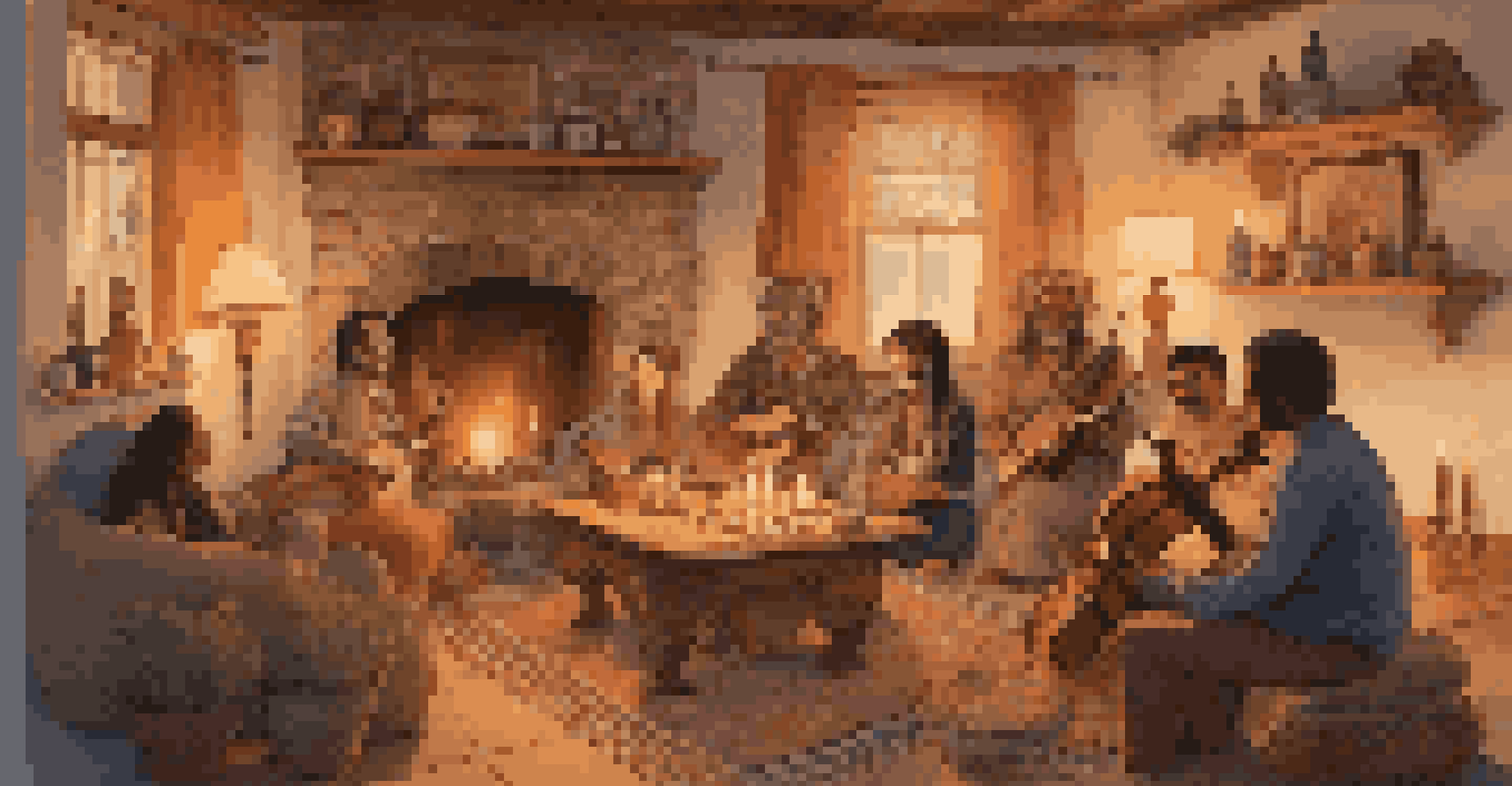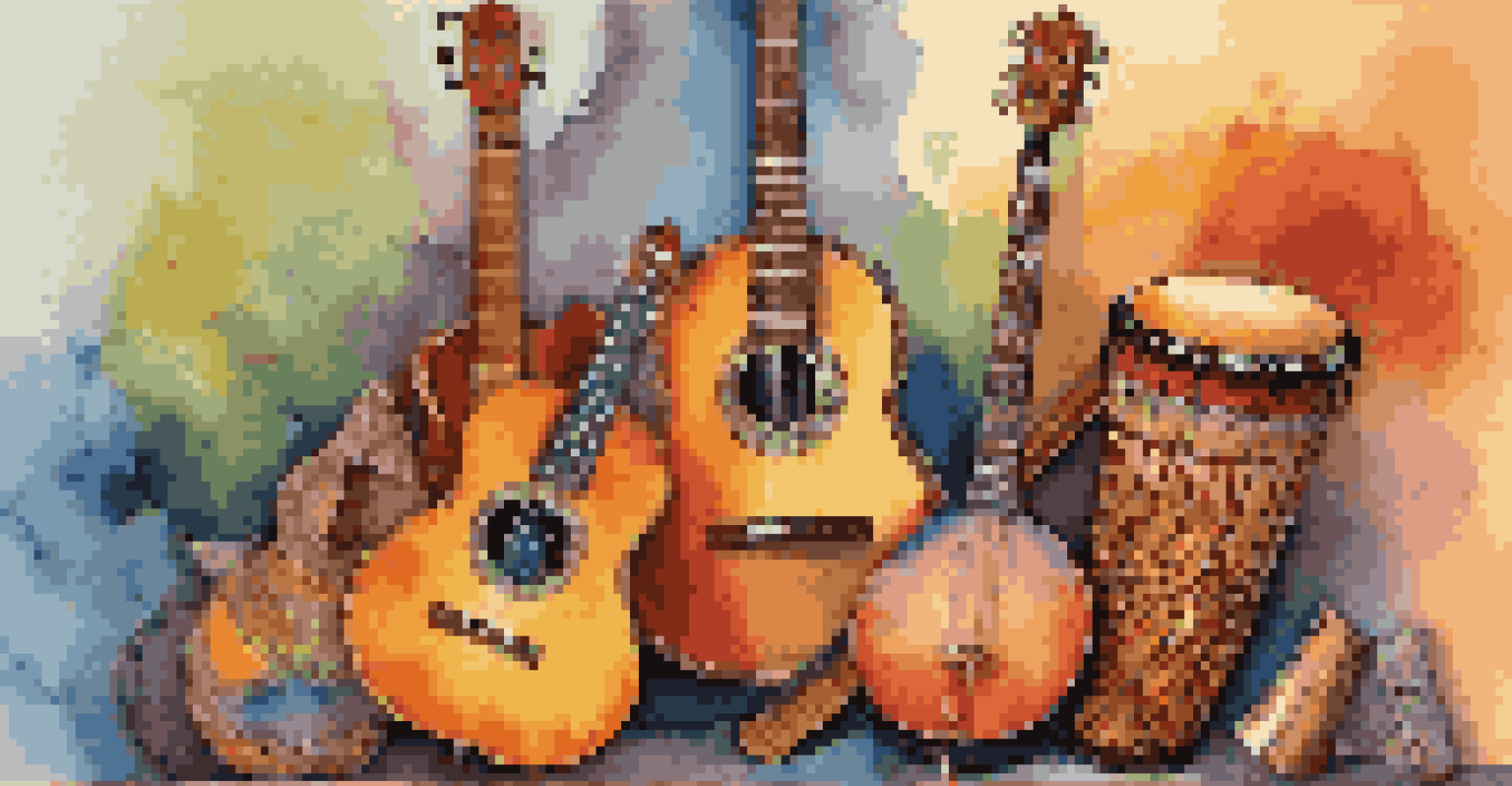Investigating the Relationship Between Music and Cultural Memory

The Power of Music in Cultural Memory Formation
Music has an incredible ability to evoke memories and emotions, serving as a powerful trigger for cultural memory. When we hear a particular song, it can transport us back to a specific moment in time, reminding us of experiences we may have long forgotten. This phenomenon is partly due to the way music is intertwined with significant events in our lives and shared cultural experiences.
Music can change the world because it can change people.
For example, think about the songs that played during important milestones, such as graduations or weddings. These songs become part of our personal narratives, linking us not only to our own past but also to the collective memory of our culture. Through these shared musical experiences, individuals forge connections with one another, deepening their sense of identity within their community.
Moreover, the emotional resonance of music plays a crucial role in how we remember cultural events. The melodies and lyrics can encapsulate the feelings of a particular time, making them more relatable and memorable. Thus, music acts as a bridge between individual memories and the larger cultural landscape.
Cultural Memory: What Is It and Why Does It Matter?
Cultural memory refers to the shared pool of knowledge and information within a community that shapes its identity and values. It encompasses traditions, stories, and symbols that are passed down through generations, influencing how a community understands itself and its history. The preservation of cultural memory is vital for maintaining a sense of continuity and belonging.

In essence, cultural memory is what binds people together, providing a framework for understanding their place in the world. Without it, individuals may feel disconnected from their heritage and the experiences of their ancestors. This is where music comes into play, as it often serves as a vehicle for transmitting cultural memory across time and space.
Music Evokes Cultural Memories
Music serves as a powerful trigger for memories, linking personal experiences to collective cultural narratives.
For instance, folk songs often tell stories of a community's struggles and triumphs, preserving historical events through melody and lyrics. These songs not only entertain but also educate, ensuring that important narratives are not forgotten. Through music, cultural memory is actively maintained and cherished.
Music as a Reflection of Historical Events
Throughout history, music has been a powerful medium for reflecting the socio-political climates of its time. From protest songs during the Civil Rights Movement to anthems of national pride, music encapsulates the sentiments of the people. These songs bear witness to historical events and serve as a commentary on societal issues, effectively capturing the spirit of an era.
Where words fail, music speaks.
Take, for example, Bob Dylan's 'The Times They Are a-Changin,' which became an anthem for change during the 1960s. Its lyrics resonated deeply with those advocating for social justice and equality, embedding the song into the cultural memory of that time. Such music not only documents history but also inspires action and unity among listeners.
Moreover, the way music is used in films and documentaries can further enhance our understanding of historical narratives. Soundtracks can evoke emotions and create connections, allowing audiences to engage with history on a deeper level. In this way, music becomes a lens through which we view and interpret our past.
The Role of Music in Personal and Collective Identity
Music plays a significant role in shaping both personal and collective identities. On an individual level, our musical preferences can reflect our tastes, beliefs, and experiences, contributing to who we are. For many, specific genres or artists resonate with their life stories, creating a soundtrack that accompanies their journey.
On a broader scale, music can unify people and create a sense of belonging within cultural or social groups. From the rhythms of traditional music to contemporary pop, these sounds often symbolize shared values and experiences, reinforcing group identity. Events like music festivals and concerts serve as communal spaces where individuals come together, celebrating their shared love for music.
Preservation of Cultural Heritage
Through active engagement in musical traditions, communities maintain their identity and pass down cultural heritage to future generations.
Furthermore, as communities evolve, so do their musical expressions, allowing for the exploration of identity in a dynamic way. This ongoing dialogue between music and identity reflects the complexity of cultural memory, as it encompasses both the past and the present, continuously shaping who we are.
Cross-Cultural Influences in Music and Memory
As globalization continues to connect cultures, the interplay between music and cultural memory becomes even more fascinating. Different musical traditions often blend together, creating new genres that reflect a fusion of influences. This cross-pollination enriches cultural memory, as it introduces diverse perspectives and experiences into the musical landscape.
For instance, the rise of world music has brought traditional sounds from various cultures to the forefront, allowing listeners to engage with global narratives. This exposure encourages appreciation and understanding of different cultures, fostering empathy and connection among people. Ultimately, music becomes a powerful tool for bridging cultural divides.
Additionally, collaborations between artists from different backgrounds can create songs that resonate on multiple levels, inviting listeners to reflect on their own cultural memories. By embracing these diverse influences, music not only preserves cultural heritage but also promotes inclusivity and mutual respect.
Music as a Tool for Preserving Cultural Heritage
In an age where globalization threatens local traditions, music serves as a vital tool for preserving cultural heritage. Many communities actively engage in efforts to document and promote their musical traditions, ensuring that they are passed down through generations. This preservation is crucial for maintaining cultural identity and continuity.
Research shows that when communities participate in musical activities, they strengthen their bonds and enhance their sense of belonging. Local festivals, workshops, and community gatherings allow individuals to share their musical heritage, celebrating their unique cultural narratives. By doing so, they not only honor their past but also inspire future generations to keep these traditions alive.
Globalization Influences Music
The blending of musical traditions across cultures enriches cultural memory, fostering empathy and connection among diverse groups.
Moreover, educational initiatives that focus on traditional music help raise awareness about cultural diversity. Schools and organizations that promote music education play a pivotal role in fostering respect for different heritages, highlighting the importance of music in cultural memory preservation.
The Future of Music and Cultural Memory
As technology continues to evolve, the way we create, share, and experience music will undoubtedly change, impacting cultural memory in new ways. Streaming platforms, social media, and digital tools have made music more accessible than ever, allowing for a broader exchange of cultural narratives. This democratization of music can enhance cultural memory by giving voice to underrepresented communities.
However, with these advancements come challenges, such as the risk of homogenization, where unique cultural expressions may become diluted. It's essential to strike a balance between embracing new technologies and preserving the authenticity of cultural traditions. By valuing and promoting diverse musical expressions, we can ensure that cultural memory remains vibrant and relevant.

Looking ahead, the ongoing dialogue between music and cultural memory will likely continue to evolve, reflecting the complexities of our globalized world. As we navigate these changes, we must remain committed to celebrating the rich tapestry of musical heritage that connects us all.